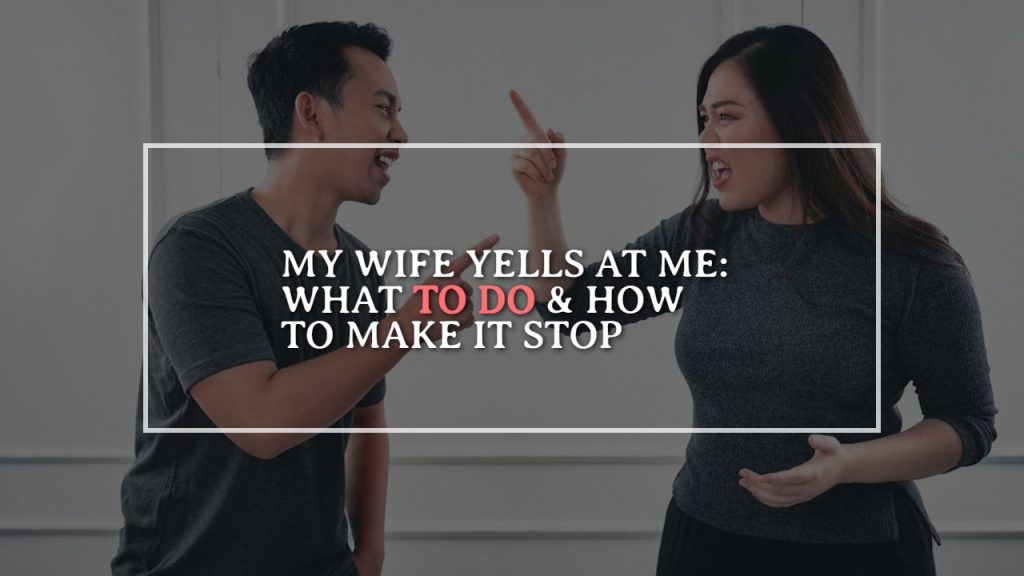When your wife often yells, it’s tough on your marriage. First, figure out why it happens. Conflicts can get tricky with emotional stress, poor communication, and unmet needs. Understanding these can help you both find ways to deal with the yelling and talk better. It’s essential to move from knowing the problem to fixing it. Both of you need to work on this; sometimes, getting help from a counselor makes a big difference.

Reasons Why My Wife Yells At Me
Communication issues
Frequent yelling can hurt a marriage. It usually happens when people don’t share their feelings well, which can frustrate them.
To fix this, listen carefully and talk clearly. Avoid guessing what your partner means or getting defensive. This will prevent misunderstandings that lead to yelling.
Unmet expectations
When a wife yells, it’s often because her expectations aren’t met. Maybe she feels let down by how things are going in her daily life, relationship, or personal goals.
When these disappointments build up, she might get frustrated. If it seems like no one’s listening or understanding her, yelling can become a way for her to express her feelings.
Emotional issues
When a wife yells, it often points to emotional distress. She might be dealing with anxiety, depression, or stress. These feelings can build up, making her feel trapped or highly frustrated, and yelling might be how it comes out. Talking about these emotional issues might help. By working on them together, you can create a calmer and more understanding space for communication.
Past traumas
Past traumas can affect why a wife yells. She might be dealing with tough things from her childhood, old relationships, or significant events that deeply hurt her. Getting help through therapy or counseling can make a big difference. It’s all about creating a safe space where she can talk about her feelings and start healing.
Stress
When stress gets too high, it can make a person yell. This might happen if someone is dealing with too much work, money problems, or not enough alone time. You can work on it together if you know what’s causing the stress. This helps make things calmer and supports a better relationship.

Strategies for De-escalation and Resolution
Active listening
Active listening is crucial when you’re dealing with a yelling spouse. It means paying attention, grasping what they’re trying to say, and responding with care. Make sure to acknowledge their feelings and let them finish speaking. This shows you respect and understand them.
Using this approach can calm things down. It helps you get to the heart of why they’re upset, which makes it easier to talk things through together.
Staying calm
Keeping calm is critical when your spouse is yelling. Try taking deep breaths to control your feelings and keep your response gentle. Speak clearly and use simple words. This not only sorts out the problem at hand but also builds better ways to talk to each other in the future.
Identifying triggers
Figuring out what sets off your wife’s yelling can really help calm things down. Watch for patterns. Does she start yelling when she’s stressed, when there’s a mix-up, or when specific topics arise?
Think about the stuff outside, like work or family, that might be getting to her. If you know what triggers the yelling, you can see it coming and maybe steer clear of those hot spots. This can make things smoother at home.

Communicating calmly and honestly
It’s essential to keep your cool and be honest when dealing with conflicts, especially with an upset partner, such as a yelling partner.
Start by talking things out. Make sure you both get a chance to speak and feel understood. You can talk about your feelings using ‘I’ statements — this means saying things like ‘I feel’ instead of ‘You make me feel.’ This helps avoid blaming the other person.
Listen well and show that you understand their feelings. It’s about both of you getting on the same page and working toward a solution together. Always be respectful and empathetic. This will help make your conversations more positive and productive.
Seeking professional help
Getting help from a professional can improve how you handle challenging situations in your relationship, especially when talking to each other is hard. Therapists or counselors know a lot about how relationships work and can give you practical tools to help you understand and respect each other better.
Going to couples therapy or marriage counseling can make a big difference. It helps both people manage their feelings better and makes the whole relationship healthier and more peaceful.
Setting boundaries
Setting clear boundaries is vital to keeping things cool and respectful in a relationship. Make sure you talk about your limits on what’s okay to do and say.
Have these chats calmly and strongly, where everyone gets to speak their mind without being judged. Sticking to these boundaries stops problems before they start and keeps the relationship healthy. It builds a good base for sorting out any issues in a friendly way.
Practicing empathy
Empathy really helps settle disputes when couples argue. It’s all about really trying to understand your partner’s feelings and seeing things from their side.
When you do this, both of you feel respected and cared for. Empathy means you listen, don’t judge, and let them know you understand. This can make a big difference, reducing stress and helping you talk things out better.
Working on problem-solving
Solving problems in marriage means keeping things cool and respectful. Start talking when both of you are calm. Set some simple rules so everyone feels listened to. Use ‘I’ statements to share your feelings without pointing fingers. Maybe think about a plan for future disagreements to stop them from getting out of hand.
Taking care of oneself
Taking care of yourself is crucial, especially when dealing with marriage troubles. It’s good to stay active—try things like exercise or yoga to beat stress. Make sure you’re getting enough sleep and eating right, too. These habits help keep your mind clear. Why not give mindfulness or meditation a shot? They can calm your emotions, making it easier to talk things out with your partner.
See – Top 200+ Self Confidence Positive Affirmations For Empowerment
Seeking professional support
Personal wellness routines are helpful, but professional support can really make a difference when dealing with a yelling wife. Marriage counselors or therapists give you specific tools for handling conflicts, such as talking to each other and solving problems together.
They also help you figure out the deeper issues that might be causing your wife’s behavior. With their help, both you and your wife can work towards a healthier and more respectful way of relating to each other.
Conclusion
In conclusion, dealing with a yelling wife means being patient, understanding her, and talking things out effectively. Keep calm when you address the problem and work together to find solutions.
If things don’t get better, it might help to see a counselor to deal with emotions and talk better. Remember, a good relationship is all about respect, understanding each other, and keeping the conversation going.
Navigate relationship challenges with help from TheBadPod.com and stay strong.
Ryan Dunn has a bunch of certificates on his desk. A few are awards for content production and marketing. Ryan still seeks to achieve. He would like to be a faster runner and higher jumper. He wants to read more books while somehow watching all the Cubs games possible. He would like to produce more written words–though not in this bio.


